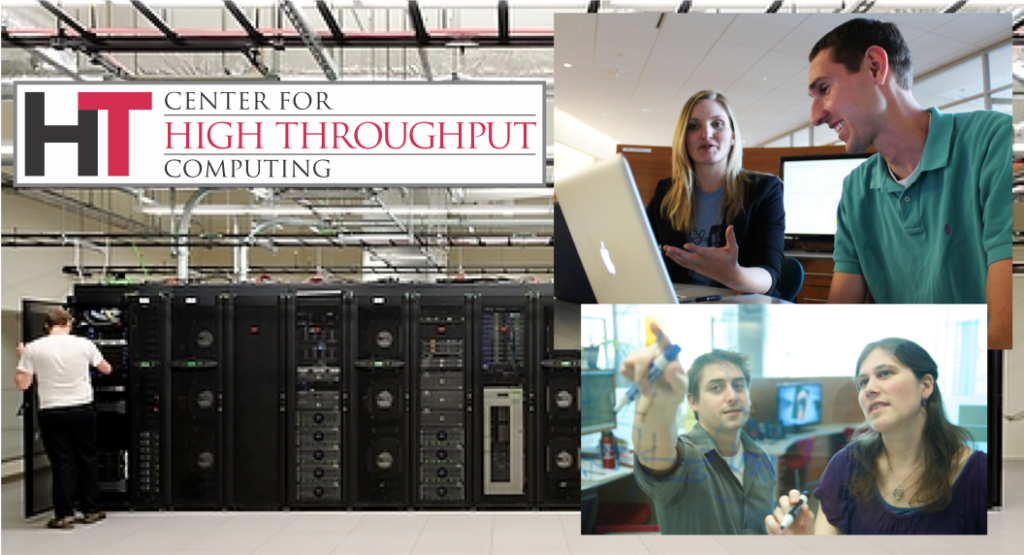
We spoke with Lauren Michael, a Research Computing Facilitator with CHTC, to learn more about the center and how their role supports researchers at UW-Madison.
Can you tell us a little bit about the CHTC? Its history and purposes?
The Center for High Throughput Computing (CHTC) serves as UW-Madison’s core research computing center, leveraging a long history of international contributions to the field of parallel computing as the pioneer of high-throughput computing (HTC) principles. This work has included decades of ongoing development of HTC technologies like the HTCondor software suite and many others that are used by companies, research institutions, and major research collaborations. Within the department of Computer Sciences, the CHTC was established in 2006 around this work, led by Director Miron Livny, professor of Computer Sciences and Chief Technology Officer for both the Wisconsin Institute for Discovery and Morgridge Institute for Research (in the Discovery building).
Because of our significant expertise in large-scale computing for research and prior experience supporting researchers at UW-Madison, CHTC’s campus role has grown to include support for researchers across domains and campus units, with a variety of consulting, learning, and technical support for researchers needing computing beyond-the-desktop, including CHTC-operating computing systems. Our resources and services are available to UW-Madison researchers, units, and collaborators, free of charge, with buy-in and collaboration opportunities for the few researchers or groups needing more than our significant, standard capabilities. The CHTC has dozens of associated staff including our Research Computing Facilitators, systems administrators, and software engineers, many of whom contribute to collaborative national and international HTC endeavors like the Open Science Grid, which campus researchers can access directly from CHTC’s computing systems.
Tell us about your role as a Research Computing Facilitator: what does that work look like?
We’re proud to have pioneered the role of Research Computing Facilitator (RCF), now nationally recognized and emulated at campus computing centers across the country (and beyond) and with similar roles implemented in other campus units. Our RCFs are the face of CHTC for researchers using our large-scale computing resources, meeting with every potential user and providing personalized guidance and upstart support. We answer ongoing questions and issues via email and drop-in office hours, develop CHTC’s user documentation, and translate the experience of our users to make CHTC’s systems and widely-used HTC technologies even better.
Furthermore, we provide guidance and liaising for researchers who may need resources other than CHTC-accessible computing capacity, pointing them to whichever resources are relevant for them, on campus or off. So you don’t have to have any intention of using CHTC computing to benefit from the expertise of our RCFs.
What types of research projects and/or data are best suited for making use of the CHTC resources?
Regardless of research field and computational methods, any research problem needing more computing capacity than you have now is a good candidate for CHTC or related services we can point you to. If the computational work you’re doing is at all limited by your current computing capacity (e.g. laptop, server, group cluster), it’s likely we can help. Perhaps your computational work is taking too long on your computer, or blocking you from using it for other work. If the program (or your computer) is crashing, if you don’t have enough space for working with data (or are using an external hard drive), we can help.
The computing systems of CHTC (like clusters at other campuses or units) are oriented toward automating computing tasks to run for you, without needing to babysit them, so they’re best for software that can be executed on the command-line and on Linux systems. We’re happy to help you figure out whether this mode applies to your work, how to get YOUR work running more optimally, and/or to point you to other options suited to YOUR goals. In many cases, we can help researchers to tackle their work with significant speed-up, whether 10X, 100X, 1000X faster (and that’s not the limit!). More importantly, researchers often find that they are able to consider and pursue new lines of inquiry that they wouldn’t have even thought possible, before.
Are there any ways researchers can prepare for using CHTC resources? Any skills or tools to familiarize themselves with?
We support researchers from any research field, and with any type/amount of prior experience with computing. Most users of our own computing systems come with a computing challenge that they can describe to us in some detail, because they’ve had limitations like the ones mentioned in the last answer, often working on their laptop or desktop. Our RCFs will help you to learn exactly what you need to, catered to your research goals and prior experience, so that YOU are in control of your computational research, and can maximize your effort and time for the research benefit you have to gain, which we also help you to estimate.
What is your favorite part of your role or supporting research on campus?
I think our RCFs and staff love learning about the wide variety of research going on around campuses, and seeing that we’ve helped researchers to make new connections within their own research projects and with other researchers and resources. Knowing that we’ve made a difference to YOUR project is what drives us. There’s no comparable feeling to seeing a ‘light bulb’ go on in a researcher’s head when they realize they can not only do more work, faster, but can tackle new problems of greater complexity and impact, all because they can effectively utilize more computing power.